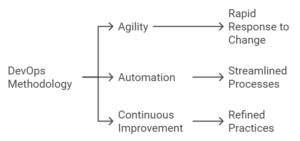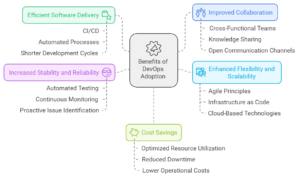
Unlock the full potential of DevOps with our guide on best practices and benefits for efficient software delivery and collaboration.
DevOps is a methodology that emphasizes collaboration, automation, and efficiency in software development and operations. Organizations can streamline their processes and accelerate software delivery by combining development and operations teams.
Understanding DevOps Methodology
Gain a clear understanding of the DevOps methodology and its core principles. DevOps is a collaborative approach that bridges the gap between software development and IT operations, enabling organizations to deliver software more efficiently and with higher quality.
At its core, the DevOps methodology emphasizes agility, automation, and continuous improvement. By breaking down silos and fostering collaboration across teams, organizations can accelerate the software development lifecycle and respond quickly to customer needs and market demands.
Agility is a fundamental component of DevOps methodology, enabling organizations to respond rapidly to changing requirements. Through continuous integration and delivery, development and operations teams can work together seamlessly, enabling faster deployment of new features and updates.
Automation is crucial in the DevOps methodology, streamlining repetitive tasks and reducing manual errors. By automating processes such as testing, deployment, and monitoring, organizations can improve reliability, scalability, and efficiency.
Continuous improvement is ingrained in the DevOps methodology, encouraging teams to constantly assess and refine their practices. Through monitoring and feedback loops, organizations can identify bottlenecks, address issues promptly, and enhance their software delivery pipeline.

Implementing DevOps Best Practices
These practices can streamline your development and operations processes, enabling efficient collaboration and faster delivery of high-quality software. Let’s explore some essential DevOps best practices:
1. Version Control
Version control is the foundation of successful software development. By using a version control system (VCS), such as Git, teams can track changes, collaborate effectively, and maintain code integrity. Adopting a structured approach to version control ensures code consistency and facilitates seamless collaboration.
2. Continuous Integration
Incorporating continuous integration (CI) into your DevOps workflow allows for frequent and automated code integration. CI tools like Jenkins or Travis CI enable developers to merge code changes regularly and detect integration issues early on. This practice helps prevent code conflicts, reduces manual effort, and accelerates the software delivery process.
3. Automated Testing
Automated testing is a critical DevOps practice for ensuring software quality and efficiency. Test automation frameworks like Selenium or JUnit can automatically execute test cases, detect bugs, and validate code changes. Automating tests not only saves time but also increases the reliability and accuracy of your software releases.
4. Infrastructure as Code
By adopting infrastructure as code (IaC), you can manage and provision infrastructure resources programmatically. Tools like Terraform or CloudFormation enable you to define your infrastructure requirements using code rather than manual configuration. This practice ensures consistency, scalability, and repeatability in your infrastructure setup, reducing the risk of errors and enabling easier infrastructure management.
5. Continuous Deployment
Continuous deployment allows for the automated release of software changes into production. By leveraging continuous delivery (CD) pipelines, organizations can deliver new features and bug fixes faster and more reliably. Continuous deployment minimizes manual intervention, reduces deployment errors, and enables teams to respond quickly to customer feedback.
Implementing DevOps best practices can greatly enhance your software delivery pipeline, fostering collaboration, efficiency, and quality.
Benefits of DevOps Adoption
Implementing DevOps in your organization can bring numerous benefits, revolutionizing your software delivery process and fostering collaboration between development and operations teams. Let’s explore the key advantages that DevOps offers:
1. Efficient Software Delivery
DevOps promotes a culture of continuous integration and continuous delivery (CI/CD), enabling faster release cycles. By automating build, test, and deployment processes, you can eliminate manual errors and streamline software delivery. This translates into shorter development cycles, quicker time to market, and reduced time between iterations.
2. Improved Collaboration
DevOps breaks down the silos between development, operations, and other teams, fostering improved collaboration. By establishing cross-functional teams, sharing knowledge, and implementing open communication channels, you can enhance cooperation and alignment across departments. This leads to better problem-solving, efficient troubleshooting, and ultimately, higher-quality software.
3. Enhanced Flexibility and Scalability
With DevOps, your organization can embrace agile principles, allowing you to quickly adapt to changing market demands. By implementing infrastructure as code (IaC) and utilizing cloud-based technologies, you gain the flexibility to scale your software systems up or down rapidly, ensuring optimal performance and cost-efficiency.

4. Increased Stability and Reliability
By automating testing, monitoring, and deployment processes, DevOps helps improve the stability and reliability of your software systems. Continuous monitoring allows you to proactively identify and address issues, minimizing downtime and customer impact. Automated testing ensures that changes are thoroughly tested before deployment, reducing the likelihood of introducing bugs or failures.
5. Cost Savings
DevOps practices can lead to cost savings by optimizing resource utilization, reducing downtime, and minimizing manual intervention. The increased efficiency and streamlined processes result in lower operational costs, improved ROI, and better resource allocation.
By adopting DevOps practices, your organization can achieve an efficient software delivery process, foster collaboration between teams, and reap the benefits of increased stability, flexibility, and cost savings. Embrace DevOps today to drive innovation and propel your business forward.
Conclusion
DevOps is not just a methodology; it is a transformative approach to software delivery and collaboration. By adopting DevOps best practices, organizations can achieve efficient and streamlined software development processes while fostering greater collaboration between development and operations teams.
The key takeaways from this guide include the importance of implementing version control, continuous integration, automated testing, and infrastructure as code. These practices ensure faster release cycles, higher-quality software, and more efficient operations.
With DevOps, organizations can reap numerous benefits, such as reduced time-to-market, improved customer satisfaction, and increased innovation.
Ready to innovate and transform your business? Say hello to CodeBeavers!
If you are looking for ways to bring your product or app ideas to life? We’ve got your back. CodeBeavers has the tools and engineers you need to make your projects come alive. With CodeBeavers, you’ll be able to build faster than ever, deploy code with ease, and scale like never before. Send us your requirements now, and let’s start winning together.




